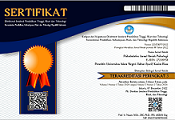Mengeksplorasi Intervensi Psikososial terhadap Postpartum Depression pada Ibu: Sebuah Tinjauan Literatur
Abstract
Postpartum depression (PPD) merupakan gangguan depresi yang dialami ibu pasca melahirkan yang memengaruhi interaksi ibu dengan bayi, serta perkembangan bayi. Munculnya gangguan depresi ini salah satunya dipengaruhi oleh faktor psikososial ibu postpartum, sehingga jenis intervensi psikososial dinilai sesuai untuk mengatasi maupun mencegah kondisi PPD pada ibu postpartum. Tinjauan pustaka ini bertujuan untuk mengkaji komponen-komponen penting dalam intervensi psikososial terhadap PPD yang berperan dalam hasil intervensi. Adapun kriteria inklusi dalam menyusun tinjauan pustaka berfokus pada artikel penelitian empiris dengan metode eksperimen yang terbit dalam kurun waktu 2015-2024 pada jurnal yang terindeksasi Sinta maupun Scopus, serta mengeksklusi penelitian dengan subjek ibu postpartum yang mengalami komplikasi penyakit ataupun gangguan lain. Berdasarkan informasi dari 10 artikel penelitian empiris yang dikaji, ditemukan 6 komponen penting yang dimaksud, yaitu komponen dukungan sosial, keterlibatan tenaga profesional dalam intervensi, mother infant bonding, durasi, media, dan metode intervensi. Melalui komponen-komponen tersebut pula dapat diketahui fokus dari intervensi psikososial yang dirumuskan dan hal-hal penting yang perlu dipertimbangkan keberadaannya selama intervensi berlangsung.
Keywords
Full Text:
PDFReferences
Abbass-Dick, J., Stern, S. B., Nelson, L. E., Watson, W., & Dennis, C. L. (2015). Coparenting breastfeeding support and exclusive breastfeeding: A randomized controlled trial. Pediatrics, 135(1), 102–110. https://doi.org/10.1542/peds.2014-1416
Alfayumi-Zeadna, S., Zeadna, A., Azbarga, Z., Salman, L., Froimovici, M., Alkatnany, A., Grotto, I., & Daoud, N. (2022). A non-randomized controlled trial for reducing postpartum depression in low-income minority women at community-based women’s health clinics. Maternal and Child Health Journal, 26(8), 1689–1700. https://doi.org/10.1007/s10995-022-03434-1
Aoyagi, S. S., & Tsuchiya, K. J. (2019). Does maternal postpartum depression affect children’s developmental outcomes? Journal of Obstetrics and Gynaecology Research, 45(9), 1809–1820. https://doi.org/10.1111/jog.14064
Aqila, A., & Dinni, S. M. (2022). Hubungan antara keikhlasan dan kematangan emosi dengan postpartum depression pada ibu primipara. Psikologika: Jurnal Pemikiran dan Penelitian Psikologi, 27(2), 315–330. https://doi.org/10.20885/psikologika.vol27.iss2.art7
Ariani, N. K. S., Darmayanti, P. A. R., & Santhi, W. T. (2022). Dukungan suami dengan proses adaptasi psikologi pada ibu nifas RSAD Denpasar Bali. Care: Jurnal Ilmiah Ilmu Kesehatan, 10(3), 450–459.
Badr, L. K. (2018). Is the effect of postpartum depression on mother-infant bonding universal? Infant Behavior and Development, 51, 15–23. https://doi.org/10.1016/j.infbeh.2018.02.003
Beck, C. T. (2020). Mother–infant interaction during postpartum depression: A metaphor analysis. Canadian Journal of Nursing Research, 52(2), 108–116. https://doi.org/10.1177/0844562119897756
Behrendt, H. F., Konrad, K., Goecke, T. W., Fakhrabadi, R., Herpertz-Dahlmann, B., & Firk, C. (2016). Postnatal mother-to-infant attachment in subclinically depressed mothers: Dyads at risk? Psychopathology, 49(4), 269–276. https://doi.org/10.1159/000447597
Brown, A., Rance, J., & Bennett, P. (2015). Understanding the relationship between breastfeeding and postnatal depression: The role of pain and physical difficulties. Journal of Advanced Nursing, 72(2), 273–282. https://doi.org/10.1111/jan.12832
Chaharrahifard, L., Motlagh, A. J., Akbari-Kamrani, M., Ataee, M., & Esmaelzadeh-Saeieh, S. (2021). The effect of midwife-led psycho-education on parental stress, postpartum depression and parental competency in high risk pregnancy women: A randomized controlled trial. Journal of Caring Sciences, 10(2), 70–76. https://doi.org/10.34172/jcs.2021.014
Cho, H., Lee, K., Choi, E., Cho, H. N., Park, B., Suh, M., Rhee, Y., & Choi, K. S. (2022). Association between social support and postpartum depression. Scientific Reports, 12(1). https://doi.org/10.1038/s41598-022-07248-7
Dennis, C. L., Grigoriadis, S., Zupancic, J., Kiss, A., & Ravitz, P. (2020). Telephone-based nurse-delivered interpersonal psychotherapy for postpartum depression: Nationwide randomised controlled trial. British Journal of Psychiatry, 216(4), 189–196. https://doi.org/10.1192/bjp.2019.275
Diannita, C. G., Manurung, E. I., & Fangidae, E. (2023). Keterlibatan keluarga dalam pelayanan kesehatan primer : Scoping review. MAHESA : Malahayati Health Student Journal, 3(3), 711–721. https://doi.org/10.33024/mahesa.v3i3.9943
Eraslan-Capan, B. (2016). Social connectedness and flourishing: The mediating role of hopelessness. Universal Journal of Educational Research, 4(5), 933–940. https://doi.org/10.13189/ujer.2016.040501
Estiningtyas, & Cahyaningtyas, A. Y. (2021). Determinants of postpartum depression in rural area, central Java, Indonesia. Journal of Health Science and Prevention, 5(1), 49–57. https://doi.org/10.29080/jhsp.v5i1.464
Faleschini, S., Millar, L., Rifas-Shiman, S. L., Skouteris, H., Hivert, M. F., & Oken, E. (2019). Women’s perceived social support: Associations with postpartum weight retention, health behaviors and depressive symptoms. BMC Women’s Health, 19(1). https://doi.org/10.1186/s12905-019-0839-6
Fares, K. K., & Ahmed, H. M. (2021). Effect of respectful maternity care and effective communication during labor on postpartum depression: an interventional study. Pakistan Journal of Medical and Health Sciences, 15(9), 2692–2698. https://doi.org/10.53350/pjmhs211592692
Franco, P., Olhaberry, M., Kelders, S., Muzard, A., & Cuijpers, P. (2024). Guided web app intervention for reducing symptoms of depression in postpartum women: Results of a feasibility randomized controlled trial. Internet Interventions, 36. https://doi.org/10.1016/j.invent.2024.100744
Gökşin, İ., & Ayaz-Alkaya, S. (2020). The effect of progressive muscle relaxation on the postpartum depression risk and general comfort levels in primiparas. Stress and Health, 36(3), 322–329. https://doi.org/10.1002/smi.2921
Hill, R., & Flanagan, J. (2019). The maternal–infant bond: Clarifying the concept. International Journal of Nursing Knowledge, 31(1), 14–18. https://doi.org/10.1111/2047-3095.12235
Holt, C., Gentilleau, C., Gemmill, A. W., & Milgrom, J. (2021). Improving the mother-infant relationship following postnatal depression: a randomised controlled trial of a brief intervention (HUGS). Archives of Women’s Mental Health, 24, 913–923. https://doi.org/10.1007/s00737-021-01116-5/Published
Huang, C., Han, W., & Hu, S. (2022). The effects of the solution-focused model on anxiety and postpartum depression in nulliparous pregnant women. Frontiers in Psychology, 13. https://doi.org/10.3389/fpsyg.2022.814892
Jannati, N., Mazhari, S., Ahmadian, L., & Mirzaee, M. (2020). Effectiveness of an app-based cognitive behavioral therapy program for postpartum depression in primary care: A randomized controlled trial. International Journal of Medical Informatics, 141. https://doi.org/10.1016/j.ijmedinf.2020.104145
Jiang, C., Zhou, H., Chen, L., & Zhou, Z. (2021). Problem solving therapy improves effortful cognition in major depression. Frontiers in Psychiatry, 12. https://doi.org/10.3389/fpsyt.2021.607718
Kusuma, P. D. (2017). Karakteristik penyebab terjadinya depresi postpartum pada primipara dan multipara. Jurnal Keperawatan Notokusumo, 5(1), 36–45.
Lieshout, R. J. Van, Layton, H., Savoy, C. D., Haber, E., Feller, A., Biscaro, A., Bieling, P. J., & Ferro, M. A. (2022). Public health nurse-delivered group cognitive behavioural therapy for postpartum depression: A randomized controlled trial. Canadian Journal of Psychiatry, 67(6), 432–440. https://doi.org/10.1177/07067437221074426
Lindayani, I. K., & Marhaeni, G. A. (2020). Prevalensi dan faktor risiko depresi postpartum di kota denpasar tahun 2019. Jurnal Midwifery Update (MU), 2(2), 100–109.
Liu, C., Chen, H., Zhou, F., Long, Q., Wu, K., Lo, L. M., Hung, T. H., Liu, C. Y., & Chiou, W. K. (2022). Positive intervention effect of mobile health application based on mindfulness and social support theory on postpartum depression symptoms of puerperae. BMC Women’s Health, 22(1). https://doi.org/10.1186/s12905-022-01996-4
Lubotzky-Gete, S., Ornoy, A., Grotto, I., & Calderon-Margalit, R. (2021). Postpartum depression and infant development up to 24 months: A nationwide population-based study. Journal of Affective Disorders, 285, 136–143. https://doi.org/10.1016/j.jad.2021.02.042
McLeish, J., Harvey, M., Redshaw, M., & Alderdice, F. (2021). A qualitative study of first time mothers’ experiences of postnatal social support from health professionals in England. Women and Birth, 34(5), e451–e460. https://doi.org/10.1016/j.wombi.2020.10.012
Milani, H. S., Amiri, P., Mohsey, M., Monfared, E. D., Vaziri, S. M., Malekkhahi, A., & Salmani, F. (2017). Effect of health care as the “home visiting” on postpartum depression: A controlled clinical trial. International Journal of Preventive Medicine, 8(20). https://doi.org/10.4103/2008-7802.204003
Missler, M., van Straten, A., Denissen, J., Donker, T., & Beijers, R. (2020). Effectiveness of a psycho-educational intervention for expecting parents to prevent postpartum parenting stress, depression and anxiety: a randomized controlled trial. BMC Pregnancy and Childbirth, 20(1). https://doi.org/10.1186/s12884-020-03341-9
Monteiro, F., Pereira, M., Canavarro, M. C., & Fonseca, A. (2020). Be a mom’s efficacy in enhancing positive mental health among postpartum women presenting low risk for postpartum depression: Results from a pilot randomized trial. International Journal of Environmental Research and Public Health, 17(13), 1–19. https://doi.org/10.3390/ijerph17134679
Nasiri, S., Akbari, H., Tagharrobi, L., & Tabatabaee, A. S. (2018). The effect of progressive muscle relaxation and guided imagery on stress, anxiety, and depression of pregnant women referred to health centers. Journal of Education and Health Promotion, 7(1). https://doi.org/10.4103/jehp.jehp_158_16
Nasiri, S., Kordi, M., Gharavi, M., & Lotfabadi, M. (2018). Effect of problem-solving therapy and relaxation on the severity of postpartum depressive symptoms: A randomized controlled trial. Nursing and Midwifery Studies, 7(1), 6–11. https://doi.org/10.4103/nms.nms_35_17
Ngai, F. W., Wong, P. W. C., Chung, K. F., Chau, P. H., & Hui, P. W. (2019). Effect of couple-based cognitive behavioural intervention on prevention of postnatal depression: multisite randomised controlled trial. BJOG: An International Journal of Obstetrics and Gynaecology, 127(4), 500–507. https://doi.org/10.1111/1471-0528.15862
Ngai, F. W., Wong, P. W. C., Leung, K. Y., Chau, P. H., & Chung, K. F. (2015). The effect of telephone-based cognitive-behavioral therapy on postnatal depression: A randomized controlled trial. Psychotherapy and Psychosomatics, 84, 294–303. https://doi.org/10.1159/000430449
Novianty, A., & Hadjam, M. N. R. (2017). Literasi kesehatan mental dan sikap komunitas sebagai prediktor pencarian pertolongan formal. Jurnal Psikologi, 44(1), 50–65. https://doi.org/10.22146/jpsi.22988
Palupi, P. (2019). Studi fenomenologi: Pengalaman primipara saat mengalami depresi postpartum. Jurnal Persatuan Perawat Nasional Indonesia, 4(2), 81–90.
Pertiwi, C. E., Armini, N. K. A., & Has, E. M. M. (2021). Relationship of family support and self-efficacy with postpartum depression among postpartum mothers. Pediomaternal Nursing Journal, 7(1), 33–39. https://doi.org/10.20473/pmnj.v7i1.21793
Pinheiro, R. T., Trettim, J. P., de Matos, M. B., Pinheiro, K. A. T., da Silva, R. A., Martins, C. R., da Cunha, G. K., Coelho, F. T., Motta, J. V. dos S., Coelho, F. M. da C., Ghisleni, G., Nedel, F., Ardais, A. P., Stigger, R. S., Quevedo, L. de A., & Souza, L. D. de M. (2021). Brief cognitive behavioral therapy in pregnant women at risk of postpartum depression: Pre-post therapy study in a city in southern Brazil. Journal of Affective Disorders, 290, 15–22. https://doi.org/10.1016/j.jad.2021.04.031
Putri, A. S., Wurisastuti, T., Suryaputri, I. Y., & Mubasyiroh, R. (2023). Postpartum depression in young mothers in urban and rural Indonesia. Journal of Preventive Medicine and Public Health, 56(3), 272–281. https://doi.org/10.3961/jpmph.22.534
Qi, W., Liu, Y., Lv, H., Ge, J., Meng, Y., Zhao, N., Zhao, F., Guo, Q., & Hu, J. (2022). Effects of family relationship and social support on the mental health of Chinese postpartum women. BMC Pregnancy and Childbirth, 22(1). https://doi.org/10.1186/s12884-022-04392-w
Rhee, E. S., & Kim, H. S. (2023). Understanding the dynamics of online social support among postpartum mothers in online communities. Maternal and Child Health Journal, 27(4), 690–697. https://doi.org/10.1007/s10995-023-03594-8
Rodríguez-Gallego, I., Vila-Candel, R., Corrales-Gutierrez, I., Gomez-Baya, D., & Leon-Larios, F. (2024). Evaluation of the impact of a Midwife-Led Breastfeeding Group Intervention on prevention of postpartum depression: A multicentre randomised clinical trial. Nutrients, 16(2). https://doi.org/10.3390/nu16020227
Sampson, M., Yu, M., Mauldin, R., Mayorga, A., & Gonzalez, L. G. (2021). You withhold what you are feeling so you can have a family’: Latinas’ perceptions on community values and postpartum depression. Family Medicine and Community Health, 9(3). https://doi.org/10.1136/fmch-2020-000504
Sangsawang, B., Deoisres, W., Hengudomsub, P., & Sangsawang, N. (2021). Effectiveness of psychosocial support provided by midwives and family on preventing postpartum depression among first-time adolescent mothers at 3-month follow-up: A randomised controlled trial. Journal of Clinical Nursing, 31, 689–702. https://doi.org/10.1111/jocn.15928
Solness, C. L., Holdefer, P. J., Hsu, T., Thomas, E. B. K., & O’Hara, M. W. (2023). Relationship factors in internet-delivered psychological interventions for veterans experiencing postpartum depression: Qualitative analysis. JMIR Mental Health, 10, 1–13. https://doi.org/10.2196/46061
Song, J. E., Kim, T., & Ahn, J. A. (2015). A systematic review of psychosocial interventions for women with postpartum stress. JOGNN - Journal of Obstetric, Gynecologic, and Neonatal Nursing, 44(2), 183–192. https://doi.org/10.1111/1552-6909.12541
Stana, A., & Miller, A. R. (2019). “Being a mom = having all the feels”: social support in a postpartum depression online support group. Atlantic Journal of Communication, 27(5), 297–310. https://doi.org/10.1080/15456870.2019.1616736
Tanti, V. P. Y., & Sebayang, S. K. (2023). The effect of kangaroo mother care on reducing postpartum depression: A systematic review. Indonesian Midwifery and Health Sciences Journal, 7(4), 390–404. https://doi.org/10.20473/imhsj.v7i4.2023.390-404
Tel, H., Ertekin Pinar, S., & Daglar, G. (2018). Effects of home visits and planned education on mothers’ postpartum depression and quality of life. Journal of Clinical and Experimental Investigations, 9(3), 119–125. https://doi.org/10.5799/jcei.458759
Tolja, R., Nakić Radoš, S., & Anđelinović, M. (2020). The role of maternal mental health, infant temperament, and couple’s relationship quality for mother-infant bonding. Journal of Reproductive and Infant Psychology, 38(4), 395–407. https://doi.org/10.1080/02646838.2020.1733503
Vaiphei, K., Manukrishnan, & Lobo, R. (2023). Psychosocial interventions in perinatal mental illness. Indian Journal of Social Psychiatry, 39(3), 204–209. https://doi.org/10.4103/ijsp.ijsp_252_23
Varma, D. S., Mualem, M., Goodin, A., Gurka, K. K., Wen, T. S. T., Gurka, M. J., & Roussos-Ross, K. (2023). Acceptability of an mHealth App for monitoring perinatal and postpartum mental health: qualitative study with women and providers. JMIR Formative Research, 7, 1–11. https://doi.org/10.2196/44500
Wang, Y. Y., Li, H., Wang, Y. J., Wang, H., Zhang, Y. R., Gong, L., Ma, J., Wang, Y., Wang, M. Z., Qiu, S. X., & Yuan, S. X. (2017). Living with parents or with parents-in-law and postpartum depression: A preliminary investigation in China. Journal of Affective Disorders, 218, 335–338. https://doi.org/10.1016/j.jad.2017.04.052
Wozney, L., Olthuis, J., Lingley-Pottie, P., McGrath, P. J., Chaplin, W., Elgar, F., Cheney, B., Huguet, A., Turner, K., & Kennedy, J. (2017). Strongest FamiliesTM Managing Our Mood (MOM): a randomized controlled trial of a distance intervention for women with postpartum depression. Archives of Women’s Mental Health, 20(4), 525–537. https://doi.org/10.1007/s00737-017-0732-y
Yamada, A., Isumi, A., & Fujiwara, T. (2020). Association between lack of social support from partner or others and postpartum depression among Japanese mothers: A population-based cross-sectional study. International Journal of Environmental Research and Public Health, 17(12), 1–15. https://doi.org/10.3390/ijerph17124270
Ye, Z., Wang, L., Yang, T., Chen, L. Z., Wang, T., Chen, L., Zhao, L., Zhang, S., Luo, L., & Qin, J. (2020). Gender of infant and risk of postpartum depression: a meta-analysis based on cohort and case-control studies. Journal of Maternal-Fetal and Neonatal Medicine, 1–10. https://doi.org/10.1080/14767058.2020.1786809
Zhao, L., Chen, J., Lan, L., Deng, N., Liao, Y., Yue, L., Chen, I., Wen, S. W., & Xie, R. H. (2021). Effectiveness of telehealth interventions for women with postpartum depression: Systematic review and meta-analysis. Dalam JMIR mHealth and uHealth (Vol. 9, Nomor 10). JMIR Publications Inc. https://doi.org/10.2196/32544
DOI: http://dx.doi.org/10.24014/pib.v6i3.31372
Refbacks
- There are currently no refbacks.
Redaksi Psikobuletin: Buletin Ilmiah Psikologi
Publisher: Universitas Islam Negeri Sultan Syarif Kasim Riau
Jl. H.R. Soebrantas Km. 15.5 No. 155 Gedung Fakultas Psikologi UIN Sultan Syarif Kasim Riau Kel. Tuahmadani Kec. Tampan Pekanbaru - Riau 28293.
E-mail : psikobuletin@uin-suska.ac.id / Website :http://ejournal.uin-suska.ac.id/index.php/Psikobuletin
Psikobuletin : Buletin Ilmiah Psikologi by Fakultas Psikologi is licensed under a Creative Commons Attribution 4.0 International License.



31.png)





